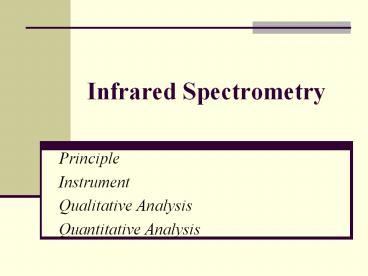Infrared Spectrometry - PowerPoint PPT Presentation
1 / 28
Title:
Infrared Spectrometry
Description:
Energy of IR photon insufficient to cause electronic ... Similar to UV-Vis spectrophotometer. Grating 10-500 lines per mm. Single beam and double beam ... – PowerPoint PPT presentation
Number of Views:264
Avg rating:3.0/5.0
Title: Infrared Spectrometry
1
Infrared Spectrometry
- Principle
- Instrument
- Qualitative Analysis
- Quantitative Analysis
2
Infrared Light
Energy of IR photon insufficient to cause
electronic excitation but can cause vibrational
or rotational excitation
3
(No Transcript)
4
The potential curve for a diatomic molecule
5
Morse energy curve for a diatomic molecule.
6
Vibrational Spectroscopy
7
Selection Rule of Infrared Spectrum
- Molecule must have change in dipole moment due to
vibration or rotation to absorb IR radiation. - Homonuclear diatomic molecules will have no IR
spectrum. - Molecule dipole moment interacts with IR photon
electric field. - Absorption causes increase in vibration
amplitude/rotation frequency.
8
Molecules with permanent dipole moments (µ) are
IR active
9
Types of Molecular VibrationsStretch-change in
bond length
- symmetric stretching
- asymmetric stretching
10
(No Transcript)
11
Types of Molecular Vibrations Bend-change in
bond angle
scissoring
wagging
rocking
twisting/torsion
12
(No Transcript)
13
Normal Modes of Vibration
- Linear molecule of N atoms normal modes 3N -
5 - Nonlinear molecule of N atoms normal modes 3N
- 6
14
Only some modes may be IR active
15
The three fundamental vibrations for sulfur
dioxide
16
How many vibrational modes?
- 2 atoms (H2) - 1 vibration
- 3 atoms (H2O) - 3 vibrations
- 3 atoms (CO2) - 4 vibrations
- 4 atoms (H2CO) - 6 vibrations
17
(No Transcript)
18
Instrumentation Sources
19
Instrumentation Transducers
20
Dispersive Grating IR Instruments
- Similar to UV-Vis spectrophotometer
- Grating 10-500 lines per mm
- Single beam and double beam
- eliminates atmospheric gas interference
21
Fourier Transform Instruments
Michelson interferometer
22
Fourier Transform
23
Jaquinot advantage
- high intensity
- improve resolution with decreaseing slit width
- signal to noise ratio (S/N ) improves with more
scans
24
Fellget advantage
- Simultaneously measure all spectrum at once saves
time
25
FTIR advantages
- High S/N ratios
- Rapid (lt10 s)
- Reproducible
- High resolution (lt0.1 cm-1)
- Inexpensive
26
Qualitative and Quantitative Analysis
- Gases-fill gas cell
- (a) transparent windows (NaCl/KBr)
- (b) long pathlength (10 cm) - few molecules
- Liquids-fill liquid cell
- (a) solute in transparent solvent - not water
- (b) short pathlength (0.015-1 mm)
- Solids-make semi-transparent pellet with KBr
27
Qualitative Analysis
- Step One Identify functional groups
- Step Two Compare with standard spectra
28
Quantitative Analysis
- IR more difficult than UV-VIS
- complex spectra
- weak incident beam
- low sensitivity
- solvent absorption
- IR mostly used for rapid qualitative but not
- quantitative analysis































